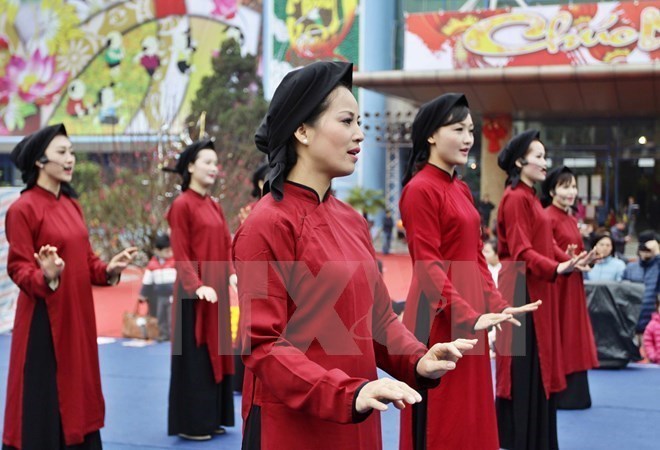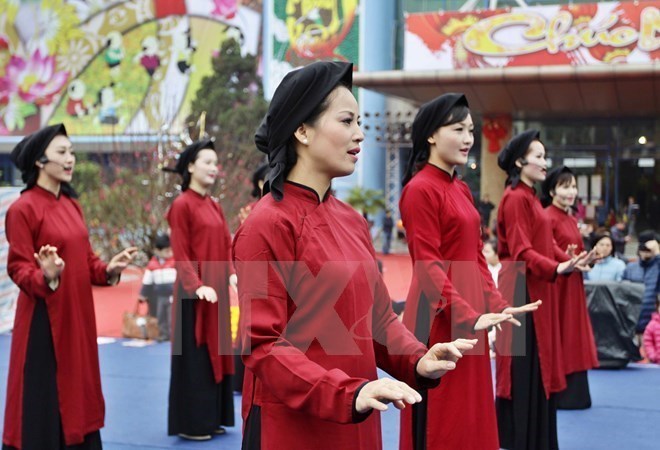
The northern province of Phu Tho launched a daily tour from Hanoi to the land of Hung Kings in early April, allowing tourists to explore traditional Xoan singing. The tour is designed to boost tourism and preserve the local intangible heritage, according to a local official.
Artists perform Xoan singing in Phu Tho province. (Photo: VNA).
The Hanoi – Phu Tho daily tour brings tourists to the Hung Temple relic site, Hung Kings Museum, Hung Lo ancient village and Lai Len Temple. Local artists perform Xoan (spring) singing between 2:00 pm and 4:00 pm at Hung Lo Communal House each day and at Lai Len Temple on weekends.
The new tour is not only vital for Phu Tho to attract more visitors but also helps the province preserve its cultural heritage, Xoan singing, which was put on UNESCO’s list of intangible cultural heritage of humanity in December last year, said Ha Ke San, Vice Chairman of the provincial People’s Committee.
Over the last six years, Phu Tho has worked to safeguard the folk music genre. It has established several Xoan singing clubs and taught it at schools across the province while training on Xoan singing performance has been also provided for promising singers, San noted.
"We hope senior artists and guild leaders will continue their training efforts to improve performing skills so visitors can get a better experience with the legacy,” said Director of the provincial Department of Culture, Sports and Tourism Nguyen Dac Thuy.
Xoan singing is practiced in Phu Tho province, often during the first two months of the lunar year. Traditionally, singers perform songs in sacred spaces such as temples, shrines and communal houses for spring festivals.
There are three forms of xoan singing: worship singing for the Hung kings and village guardian spirits, ritual singing for good crops, health and luck and festival singing where villagers alternate between male and female voices in a form of courtship.
Each Xoan music guild is headed by a leader, referred to as the "trum”, male instrumentalists are called "kep” and female singers "dao”.
Xoan singing is accompanied by dancing and musical instruments such as clappers and drums. The music has a sparse structure with few ornamental notes and simple rhythms, and Xoan is characterised by a modulation between singers and instrumentalists at the fourth interval. Knowledge for singing, dancing and playing drum and clappers are traditionally transmitted orally by the guild leader.
On the occasion of the Hung Kings Temple Festival, which is scheduled to take place between April 20 and 25 this year, Xoan singing performances will be held between 8:00 am and 4:00 pm every day at these two venues.
Legend has it that the Hung Kings ruled Vietnam from 2879 BC until 258 BC and are considered the founder of the nation. To honour the Kings, the tenth day of the Lunar March, which falls on April 25 this year, serves as the national commemorative anniversary for them.
Source: VNA
A diverse chain of eco-tourism and resort destinations concentrated in Hoa Binh city and the districts of Tan Lac, Da Bac, and Luong Son… Along with the launch of several key high-quality resort tourism projects, these developments have reshaped the landscape and enhanced the appeal of Hoa Binh as a travel destination.
Boasting diverse terrain, a mild climate, and rich natural resources, Cao Phong district is increasingly asserting its place on Vietnam’s tourism map, attracting both domestic and foreign visitors. The district is renowned for its stunning landscapes, majestic mountains, a crystal-clear hydropower lake, and the unique cultural identity of local ethnic groups.
With its pristine landscapes, unique cultural heritage of Muong ethnic minority, and an expanding range of visitor experiences, Tan Lac district of Hoa Binh has fast become a captivating destination for both domestic and international tourists.
Until now, Sung village in Cao Son commune, Da Bac district remains the only Dao ethnic community in Hoa Binh province to develop a community-based tourism model. Beyond its untouched natural landscapes, cultural identity serves as the cornerstone attraction for visitors.
Alongside the diverse cultural identities of the Kinh, Muong, Tay, Thai, Dao, and Mong ethnic people, Hoa Binh province is also renowned as the "capital" of the northwestern Vietnamese cuisine, offering unique and distinctive dishes. At festivals, during Lunar New Year (Tet), or on significant family or community occasions, special dishes are prepared, leaving a lasting impression on visitors.
A Phong Linh (Yellow Tabebuia) flower garden in Thang village, Thach Yen commune, Cao Phong district is currently in full bloom, drawing a large number of visitors.



